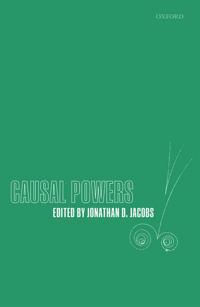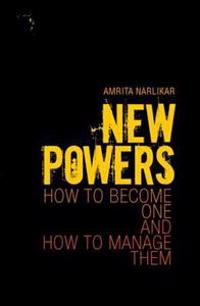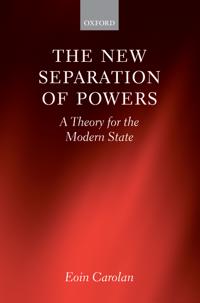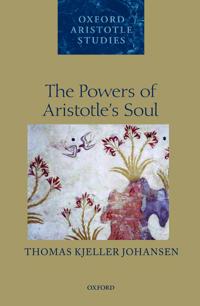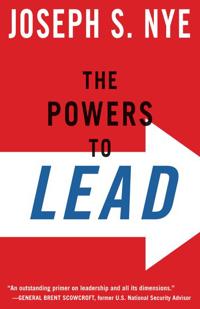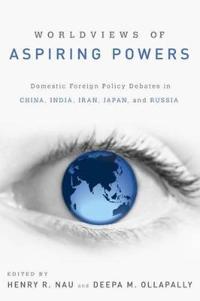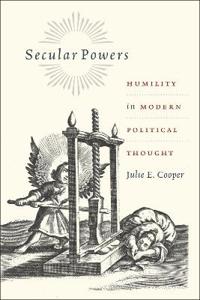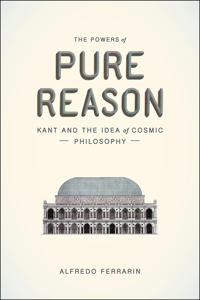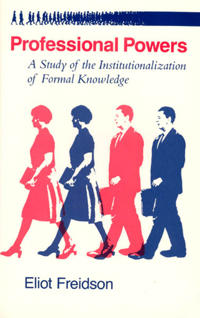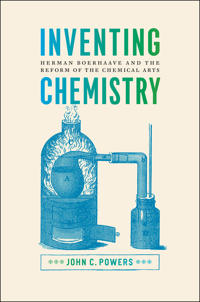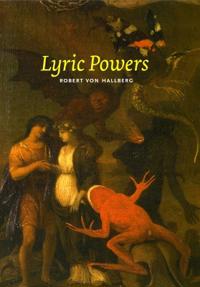United Nations and the Development of Collective Security, The: The Delegation by the UN Security Council of Its Chapter VII Powers (Pocket)
avDan Sarooshi
ISBN: 9780198299349 - UTGIVEN: 2000-08-03Getting Causes from Powers (Häftad)
avStephen Mumford
ISBN: 9780198709626 - UTGIVEN: 2014-12Causation is everywhere in the world: it features in every science and technology. But how much do we truly understand it? Do we know what it means to say that one thing is a cause of another and do we understand what in the world drives causation? Getting Causes from Powers develops a new and origi[...]
The Powers of Aristotle's Soul
ISBN: 9780198728993 - UTGIVEN: 2015-08Aristotle is considered by many to be the founder of 'faculty psychology'-the attempt to explain a variety of psychological phenomena by reference to a few inborn capacities. In The Powers of Aristotle's Soul, Thomas Kjeller Johansen investigates his main work on psychology, the De Anima, from this [...]
EU Powers Under External Pressure
ISBN: 9780198785545 - UTGIVEN: 2019-02EU external actions have deep constitutional and institutional implications for EU law and practices. The EU's competences in external relations have continuously increased, including with the entry into force of the Treaty of Lisbon. As a result, the EU has become ever more active in external relat[...]
Causal Powers
ISBN: 9780198796572 - UTGIVEN: 2017-04Causal powers are ubiquitous. Electrons are negatively charged; they have the power to repel other electrons. Water is a solvent; it has the power to dissolve salt. We use concepts of causal powers and their relatives-dispositions, capacities, abilities, and so on-to describe the world around us, bo[...]
Blackstone's Guide to the Investigatory Powers Act 2016
ISBN: 9780198801757 - UTGIVEN: 2018-01This text provides a clear and accessible introduction to the Investigatory Powers Act, a foundational piece of UK national security law. This act is a blueprint for how state agencies, the police, and internet and telephone companies protect privacy and extract data to protect the public from terro[...]
Powers (Häftad)
avGeorge Molnar
ISBN: 9780199204175 - UTGIVEN: 2006-11George Molnar came to see that the solution to a number of the problems of contemporary philosophy lay in the development of an alternative to Hume's metaphysics. This alternative would have real causal powers at its centre. Molnar set about developing a thorough account of powers that might persuad[...]
Powers Of Persuasion (Inbunden)
avWinston Fletcher
ISBN: 9780199228010 - UTGIVEN: 2008-07-10During much of the second half of the 20th century advertising in Britain led the world. Powers of Persuasion tells the story of this dynamic, exhilarating era, with pen portraits of the personalities involved, anecdotes, and case histories - written from the inside by one of the industry's leaders [...]
Powers: A Study in Metaphysics (Inbunden)
avGeorge Molnar
ISBN: 9780199259786 - UTGIVEN: 2003-05-08International Organizations and Their Exercise of Sovereign Powers (Inbunden)
avDan Sarooshi
ISBN: 9780199283255 - UTGIVEN: 2005-07-14New Powers: How to Become One and How to Manage Them
ISBN: 9780199327263 - UTGIVEN: 2010-09Being the new kid on the block is seldom easy at any level, and it is certainly not easy in the anarchical world of international politics. New powers such as Brazil, China and India have to tread a difficult balance as they negotiate their way to the top. They must signal a sufficient level of conf[...]
The New Separation of Powers (Inbunden)
avEoin Carolan
ISBN: 9780199568673 - UTGIVEN: 2009-10The separation of powers is an important principle of liberal constitutionalism. However, the traditional rationale behind institutional separation can no longer govern the distribution of authority in the modern state. This book develops a new model of the separation of powers theory for the admini[...]
The Powers of Aristotle's Soul (Inbunden)
avThomas Kjeller Johansen
ISBN: 9780199658435 - UTGIVEN: 2012-10Aristotle is considered by many to be the founder of 'faculty psychology'-the attempt to explain a variety of psychological phenomena by reference to a few inborn capacities. In The Powers of Aristotle's Soul, Thomas Kjeller Johansen investigates his main work on psychology, the De Anima, from this [...]
Getting Causes from Powers (Inbunden)
avStephen Mumford
ISBN: 9780199695614 - UTGIVEN: 2011-09Causation is everywhere in the world: it features in every science and technology. But how much do we truly understand it? Do we know what it means to say that one thing is a cause of another and do we understand what in the world drives causation? Getting Causes from Powers develops a new and origi[...]
The Powers to Lead (Pocket)
avJoseph S., Jr. Nye
ISBN: 9780199754137 - UTGIVEN: 201009With The Powers to Lead, Joseph S. Nye Jr. offers a sweeping look at the nature of leadership in today's world, in an illuminating blend of history, business case studies, psychological research, and more. As he observes, many now believe that the more authoritarian and coercive forms of leadership-[...]
Worldviews of Aspiring Powers (Pocket)
avHenry R. Nau, Deepa M. Ollapally, Henry R. Nau
ISBN: 9780199937493 - UTGIVEN: 201210Worldviews of Aspiring Powers provides a serious study of the domestic foreign policy debates in five world powers who have gained more influence as the US's has waned: China, Japan, India, Russia and Iran. Featuring a leading regional scholar for each essay, each essay identifies the most important[...]
Secular Powers
ISBN: 9780226081298 - UTGIVEN: 2013-10Secularism is usually thought to contain the project of self-deification, in which humans attack God's authority in order to take his place. Julie E. Cooper overturns this conception through an incisive analysis of the early modern justifications for secular politics. While she agrees that secularis[...]
The Powers of Pure Reason
ISBN: 9780226243153 - UTGIVEN: 2015-04The Critique of Pure Reason - Kant's First Critique - is one of the most studied texts in intellectual history, but as Alfredo Ferrarin points out in this radically original book, most of that study has focused only on very select parts. Likewise, Kant's oeuvre as a whole has been compartmentalized,[...]
Professional Powers (Häftad)
ISBN: 9780226262253 - UTGIVEN: 1988-05"This is an immensely useful book for sociologists working in a wide range of sub-fields. It confirms Freidson's status among the leading exponents of the old Chicago tradition. This book is catholic in its reading, sophisticated in its arguments and cautious in its judgements."--Robert Dingwall, "S[...]
Inventing Chemistry (Inbunden)
avJohn C. Powers
ISBN: 9780226677606 - UTGIVEN: 2012-04In "Inventing Chemistry", historian John C. Powers turns his attention to Herman Boerhaave (1668-1738), a Dutch medical and chemical professor whose work reached a wide, educated audience and became the template for chemical knowledge in the eighteenth century. The primary focus of this study is Boe[...]
Lyric Powers (Inbunden)
avRobert Von Hallberg
ISBN: 9780226865003 - UTGIVEN: 2008-10The authority of poetry varies from one period to another, from one culture to another. For Robert von Hallberg, the authority of lyric poetry has three sources: religious affirmation, the social institutions of those who speak the idioms from which particular poems are made, and the extraordinary c[...]
Intimate Revolt: The Powers and Limits of Psychoanalysis (Övrig)
avJulia Kristeva
ISBN: 9780231114141 - UTGIVEN: 2002-03-28Julia Kristeva, herself a product of the famous May '68 Paris student uprising, has long been fascinated by the concept of rebellion and revolution. Psychoanalysts believe that rebellion guarantees our independence and creative capacities, but is revolution still possible? Confronted with the cultur[...]
Gold Standard at the Turn of the Twentieth Century, The: Rising Powers, Global Money, and the Age of Empire (Övrig)
avSteven Bryan
ISBN: 9780231152525 - UTGIVEN: 2010-08-09By the end of the nineteenth century, the world was ready to adopt the gold standard out of concerns of national power, prestige, and anti-English competition. Yet although the gold standard allowed countries to enact a virtual single world currency, the years before World War I were not a time of u[...]





